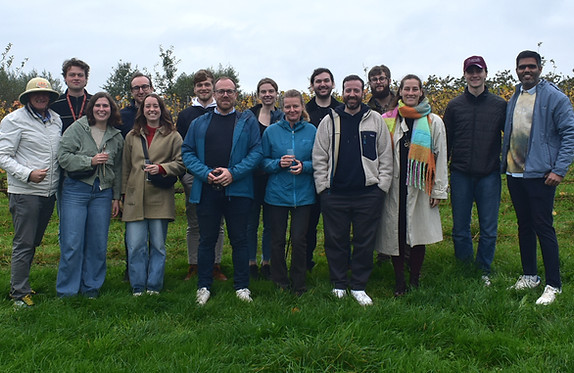

What's new in PGCI?
The PGCI Lab is thrilled to announce that Astrid Severyns has completed and successfully defended her PhD thesis! This milestone highlights her perseverance, dedication, and the high-quality research she conducted during her time with us. We are incredibly proud of her achievement.
We wholeheartedly congratulate her and express our deep appreciation for the impact of her work on our lab’s research mission. Our thanks also go to the advisors, committee members, and collaborating institutions whose guidance and support helped make this accomplishment possible.

PhD Vacancy – Meiotic Recombination in Tomato
Are you passionate about plant genetics and excited to explore the mechanisms of meiotic recombination in crops? Join our team at PGCI lab at the KU Leuven as a Doctoral Research Fellow to strengthen our ongoing research in this vital area.
Focus: Meiotic recombination in tomato
Start your journey into applied plant meiosis
Deadline to apply: August 3, 2025
Postdoctoral Research Fellow - Genetic Recombination for Advanced Crop Breeding
Are you passionate about plant genetics, meiosis, and cutting-edge crop breeding innovation? The Laboratory for Plant Genetics and Crop Improvement (PGCI) at KU Leuven is looking for a Postdoctoral Researcher to join our ambitious MeioCOntrol project.
This FWO-SBO funded initiative unites KU Leuven, ILVO, and UGent in unraveling the key determinants of meiotic recombination in maize, soybean, and tomato — with the goal of boosting genetic diversity and breeding efficiency.
We’re seeking a postdoctoral researcher with a PhD in plant genetics or related fields, strong expertise in CRISPR, genomics, and bioinformatics, and proven coordination skills to lead cross-institutional research, supervise PhD projects on key crops, apply advanced molecular techniques, and engage with industry partners—ideally with additional experience in meiotic cytology, microscopy, or breeding industry collaboration.
Deadline to apply: August 17, 2025
We’re excited to share our latest publication, "Gibberellin Treatment Impacts Fruit Shape in the Pyrus Communis Cultivar “Conference” Through Increased Retention of Apical Fruit", authored by Hanne Claessen and Han Palmers.
This study investigates the long-suspected link between gibberellin treatments and fruit deformation in the widely cultivated Pyrus communis cultivar “Conference.” These pears are often prone to developing an undesirable “bottle-shaped” appearance, leading to reduced market value and economic losses. By analyzing the effects of gibberellin treatments across two cultivars—“Conference” and “Doyenné du Comice”—and considering flower position within the cluster, the study reveals that gibberellins do not directly deform the fruit. Instead, the treatments promote retention of apical flowers, which naturally produce more elongated fruit, thereby increasing the proportion of misshapen pears.
Read the full study at the link below.
Claessen, H. Palmers, H. Keulemans, W. Van De Poel, B. De Storme, N.
International Journal of Fruit Science, 25(1), 143–159.
DOI: 10.1080/15538362.2025.2497301
New Publications
Claessen, H. Palmers, H. Keulemans, W. Van De Poel, B. De Storme, N.
International Journal of Fruit Science, 25(1), 143–159.
DOI: 10.1080/15538362.2025.2497301
CRISPR–Cas systems and applications for crop bioengineering.
Uranga, M. Martín-Hernández, A.M. De Storme, N. Pasin, F.
Frontiers in Bioengineering and Biotechnology 12 (2024): 1483857
DOI: 10.3389/fbioe.2024.1483857
Claessen, H. Palmers, H. Keulemans, W. Van de Poel, B. De Storme, N.
Front. Genet. Sec. Genomics of Plants and the Phytoecosystem. Volume 15 - 2024 https://doi.org/10.3389/fgene.2024.1360332
Susceptibility to drastic temperature fluctuations and low light levels during plant reproduction.
Begcy, K. Mendes, M.A., De Storme, N.
Front. Plant Sci., Sec. Plant Abiotic Stress, Volume 15 - 2024 | doi: 10.3389/fpls.2024.1369070
Svara, A. De Storme, N. Carpentier, S. Keulemans, W. De Coninck, B.
Horticulture Research, DOI: uhae002

Our mission statement
One of the main scientific challenges in the coming years will be to guarantee a stable food supply in the face of climate change, environmental degradation and an increasing world population. Key to meeting these challenges is the development of new, stress resistant crop varieties for sustainable growth and production.
Therefore, our mission at PGCI is to conduct excellent research in plant sciences for the improvement of fruit production and quality, to protect the environment, and to benefit consumer health.
PGCI works primarily with apple, pear banana and model plant Arabidopsis, applying cutting edge knowledge and technologies to gain understanding into the control of biological processes necessary for modern and efficient fruit breeding and selection programs. We also provide training in the biosciences, actively follow opportunities for knowledge transfer and innovation to industry, and aim to engage the public and other interested stakeholders in dialogue on issues of scientific interest.


